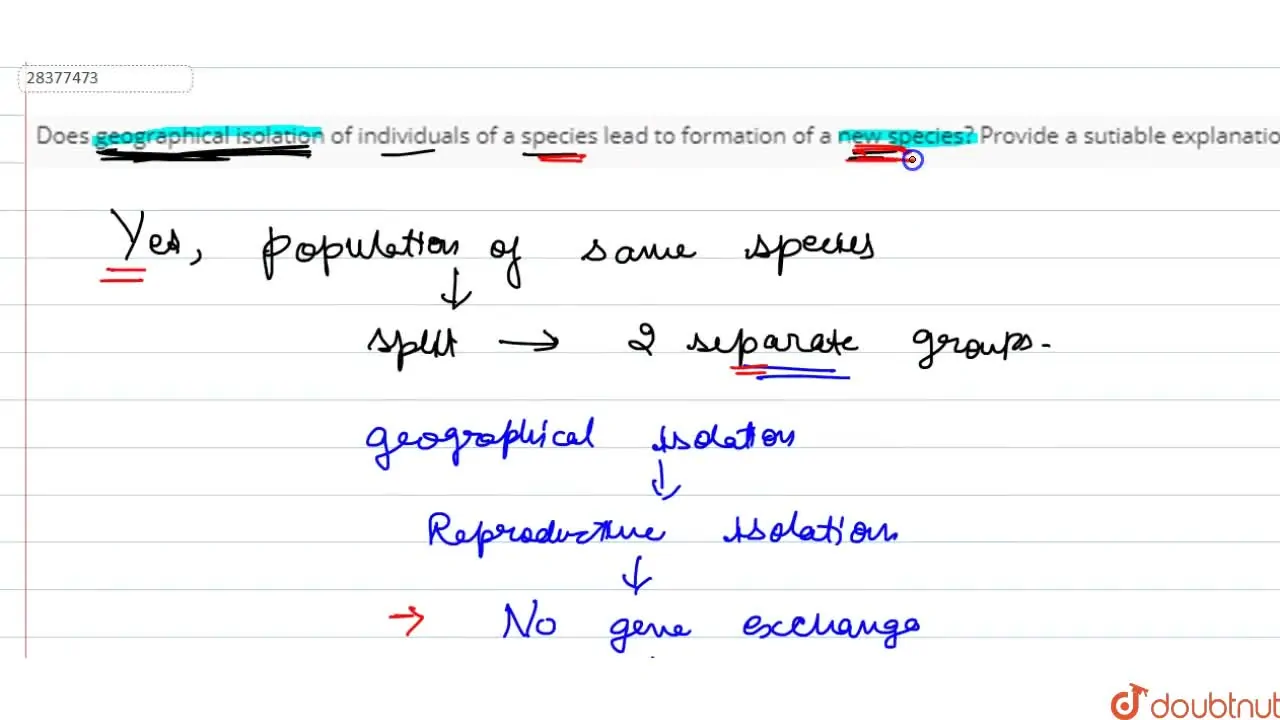Does geographical isolation of individuals of a species lead to formation of a new species? Provide a sutiable explanation.
Yes, geographical isolation of individuals of a species lead to formation of a new species. If we consider the population of same species splitting into two separate groups and getting isolated from each other geographically by various barriers as sea, mountain, etc. The geographical isolation of the two groups lead to their reproductive isolation due to which no genes are exchanged between them. However, breeding continues within the isolated populations producing more and more generations. Over the generations, genetic drift and natural selection operated in the isolated group and made them more different from other. After many years, the individuals of isolated groups will become so different that they will be incapable of reproducing with each other (if they meet again) and new species will originate evolved. Turtles of the Galapagos Islands show a good example of speciation due to geographical isolation.
Turtles on different islands were geographically isolated. Individuals from one island could not meet with those from another island. So, genetic flow between different groups of turtle could not take place. Over several generations, the degree and types of variations were markedly different in different groups. This led to formation of new species. Turtles on different islands represent altogether different species.
Related Playlists
- BOOK - OSWAL PUBLICATIONCHAPTER - HEREDITYEXERCISE - BOARD CORNER (Very Short Answer Type Questions)4videos
HEREDITY
- BOOK - OSWAL PUBLICATIONCHAPTER - HEREDITYEXERCISE - BOARD CORNER (Short Answer Type Questions)10videos
HEREDITY
- BOOK - OSWAL PUBLICATIONCHAPTER - HEREDITYEXERCISE - NCERT EXEMPLAR (SHORT ANSWER QUESTIONS)11videos
HEREDITY
- BOOK - OSWAL PUBLICATIONCHAPTER - DIKSHA QUESTIONS EXERCISE - ENVIRONMENT (MULTIPLE CHOICE QUESTIONS)6videos
DIKSHA QUESTIONS
- BOOK - OSWAL PUBLICATIONCHAPTER - HEREDITY AND EVOLUTION EXERCISE - CREATING BASED QUESTIONS11videos
HEREDITY AND EVOLUTION
Similar Questions
Does geographical isolation of individuals of a species lead to the formation of a new species ? Provide a suitable explanation for your answer.
View SolutionDoes geographical isolation of individuals of a species lead to formation of a new species? Provide a suitable explanation.
View SolutionDoes geographical isolation of individuals of a species lead to formation of a new species? Provide a suitable explanation.
View SolutionWhat is true for individuals of same species ?
View SolutionWhat is true for individuals of same species?
View SolutionWhat is true for individuals of same species:-
View SolutionGenetically similar individuals of species are :
View SolutionThe factors involved in the formation of new species are
View SolutionList the steps involved in the formation of new species.
View SolutionSexually reproducing individuals of a species :
View Solution


